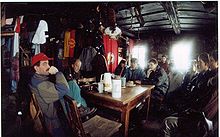Gustav Ginzel
Gustav Ginzel (born February 28, 1932 in Reichenberg , Czechoslovakia ; † November 28, 2008 in Kempten (Allgäu) ) was a geologist , mountaineer , mountain guide , skier, cave explorer, conservationist , book author , bon vivant and nature photographer . He bought a decaying house used as a stable ( Jizerka / Klein-Iser 8 ), and by means of a rerouted brook, he flushed the manure out of the building by the tens of thousands, making it the famous manure house .
Life
Ginzel, who came from a German-Bohemian family, was a German and Czechoslovak citizen. He grew up in a family of nine. After the Second World War , the family was able to stay in Czechoslovakia because his father was a technical specialist in textile machines. As a German, he was not allowed to take up direct studies, so that he acquired his knowledge by distance learning and autodidactically .
In 1968 Gustav Ginzel and friends organized an international expedition to the East Sayan (Siberia) , in which Georg Renner from the GDR took part . In 1969 he was a participant in a volcanological expedition to Stromboli . For political reasons he was not allowed to travel to South America in 1970. All members of this Andean expedition died on Huascarán in Peru by a large ice avalanche that was triggered by an earthquake and completely wiped out the place Yungay there . Ginzel was very affected by this event and ensured regular commemorations. He was the main organizer of the annual Jizera Mountains Run ("Jizerská Padesatka"), which has since been dedicated to the victims of the accident.
In 1972 Ginzel took part in the successful Polish-Czech Cotopaxi expedition. From 1973 to 1975 he toured the Sahara . Between 1990 and 1995 he traveled continuously, including in Nepal , New Zealand and Australia . Exactly at the time when he was climbing Ayers Rock , the sacred mountain of the Aborigines , his house burned down with its not only ideally valuable collections and all of his image archive, presumably through arson.
Dung house
In 1963 Ginzel acquired his new domicile for 350 Czechoslovak crowns. This rustic manure house is located in Jizerka ( Klein Iser ), a district of Kořenov , the highest place in the Jizera Mountains . When Gustav Ginzel was not traveling, he was happy to receive day visitors and overnight house guests with his legendary house tours. Ginzel collected all kinds of signs, books, magazines, curiosities in his house. His popular science slide lectures about his homeland, the flora and fauna of the Jizera Mountains, and especially the expeditions, were popular with GDR citizens who were denied these world travel opportunities.
Due to its popularity, Jizerka experienced a large number of visitors, but primarily Ginzel and the dung house . In 1981 Gustav Ginzel had to spend several months in custody because Neider from his place had denounced him to the Czechoslovak State Security.
Numerous tour operators chose the dung house as a destination for day trips. After the fall of the wall , the number of visitors dropped significantly.
Since 2000 Gustav Ginzel's health was increasingly restricted; the dung house was closed to public traffic. From then on Gustav Ginzel lived with his sister in Kempten (Allgäu). His brother Wolfgang Ginzel , who was the manager of the dung house, died in spring 2004.
Ginzel died on November 28th, 2008 at the age of 76 in the Allgäu. Ginzel found his final resting place in March 2009 in the cemetery in the Rudolfov district of Liberec . On May 31, 2009, a public memorial service with numerous guests from the Czech Republic, Germany and the rest of Europe took place at the mountaineers cemetery in Hrubá Skála . Funeral speeches were held in various languages at the Protestant mass; the German speech was given by the Saxon politician Heinz Eggert .
Sociopolitical action
Ginzel has been strongly committed to environmental protection measures since the 1960s. In particular, he drew attention to the devastating death of forests on the ridges of the Jizera Mountains caused by the flue gases from the lignite power stations and supervised a meteorological environmental measuring station of the hydro-meteorological service of the ČSSR , whose climate and sulfur oxide values were evaluated in Prague. He also worked on the restoration of the former manor house of the Riedel family of glassmakers in Jizerka and on the use of the former school building as a branch of the Jizera Mountains Museum in Liberec .
Because of his contacts with personalities of the opposition in the ČSSR and GDR, who often met at his place, Gustav Ginzel was monitored by the State Security of the GDR as well as by the Czechoslovak authorities and was temporarily banned from traveling.
literature
- Jan Šebelka a kol .: Podivín, který okrášlil svět aneb Vzpomínání na Gustava Ginzela. 2015 ISBN 978-80-904798-7-6
Web links
- Literature by and about Gustav Ginzel in the catalog of the German National Library
- Obituary at deník.cz
Individual evidence
- ↑ Eva Jeschkova Saxon newspaper of 19 June 2007, page 6
- ↑ Jana Ulbrich: “One last glass of red wine for Gustav Ginzel” , Sächsische Zeitung of December 4, 2008
- ↑ http://www.sz-online.de/nachrichten/artikel.asp?id=2149809&newsfeed=rss Funeral service for dung host Gustav Ginzel
| personal data | |
|---|---|
| SURNAME | Ginzel, Gustav |
| BRIEF DESCRIPTION | German-Czech mountaineer and traveler |
| DATE OF BIRTH | February 28, 1932 |
| PLACE OF BIRTH | Reichenberg (Bohemia) |
| DATE OF DEATH | November 28, 2008 |
| Place of death | Kempten (Allgäu) |

